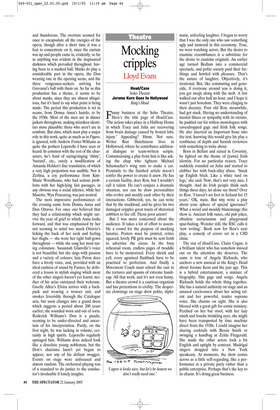Mocking cripples
Lloyd Evans
Head/Case Soho Theatre Jerome Kern Goes to Hollywood King’s Head Funny business at the Soho Theatre. Here’s the title page of Head/Case. ‘The action takes place in a Halfway Home in which Tracy and Julia are recovering from brain damage caused by frontal lobe injury.’ Appealing? Hmm. Not sure. Writer Ron Hutchinson lives in Hollywood, where he contributes additional dialogue to team-written scripts. Commissioning a play from him is like asking the chap who tightens Michael Schumacher’s wing nuts to make a car. Proximity to the finished article doesn’t confer the power to create it anew. He has a certain facility, does Ron, but I wouldn’t call it talent. He can’t conjure a dramatic situation, nor can he draw personalities who evolve and modify each other by their interactions. Gibberish, yes, he can write that by the truckload, and he gives his two damaged cripples great tracts of rhetorical cobblers to fire off. Those poor actors!
But I was more concerned about the audience. It takes a lot of effort to assemble a crowd for the purpose of mocking lunatics. Posters must be printed, critics squared, lovely PR girls must be sent forth to advertise the circus. In the busy rehearsal room, endless pages of twaddle have to be memorised. Every shriek and yell, every agonised flashback have to be practised to perfection. And finally a Movement Coach must school the cast in the tortures and spasms of extreme handicap. All that work, and it’s not even funny. But a theatre crowd is a cautious organism and has pretentions to civility. The desperate clownings on stage drew polite, diplo matic, unfeeling laughter. I began to worry that I was the only one who saw something ugly and immoral in this ceremony. True, we were watching actors. But the desire to examine resemblances is a substitute for the desire to examine originals. An earlier age turned Bedlam into a commercial spectacle, and polite society paid their farthings and howled with pleasure. That’s the nature of laughter. Objectively, it’s irrational. But, like commuting and genocide, if everyone around you is doing it, you get swept along with the mob. A few walked out after half an hour, and I hope it wasn’t just boredom. They were clinging to their decency. Poor old Ron, meanwhile, had got stuck. Having no understanding of mental illness or sympathy with its victims, he padded out his witless monologues with eavesdropped gags and Irish folk songs. He also inserted an Important Issue into the text, knowing this would give his play a semblance of depth and furnish reviewers with something to write about.
Born in Belfast and raised in Coventry, he lighted on the theme of (yawn) Irish identity. For no particular reason, Tracy suddenly rounded on Julia and started to clobber her with back-alley abuse. ‘Stuck up English bitch. Like a white turd on legs,’ she said. Now, that’s not very nice, I thought. And do Irish people think such things these days, let alone say them? Over to Ron. ‘I haven’t set foot in Ireland for 15 years.’ OK, mate. But why write a play about your sphere of special ignorance? What a weird and mouldy blancmange this show is. Ancient folk tunes, old pub jokes, obsolete sectarianism and playground spaz-baiting. Weirder still, the RSC calls it ‘new writing’. Book now for Ron’s next play, a comedy of errors set in a CJD clinic.
The star of Head/Case, Claire Cogan, is a brilliant talent who has somehow missed out on the attention she deserves. The same is true of Angela Richards, who anchors a new musical at the King’s Head about Jerome Kern and the jazz age. This is a hybrid entertainment, a mixture of biography, film gags and songs. Angela Richards holds the whole thing together. She has a natural authority on stage and an amused carelessness about her acting talent and her powerful, tender soprano voice. She charms on sight. She is also blessed with a great gift for comic mimicry. Perched on her bar stool, with her lazy smirk and louche twinkling eyes, she might have been transported by time machine direct from the 1920s. I could imagine her sharing cocktails with Bessie Smith or swinging a handbag at Zelda Fitzgerald. She made the other actors look a bit English and uptight by contrast. Madrigal singers dropped into a New York speakeasy. At moments, the show comes across as a little self-regarding, like a performance at a private party rather than a public enterprise. Perhaps that’s the key to its charm. It’s doing great business.













































 Previous page
Previous page